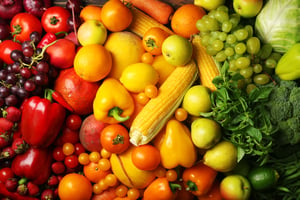Seeds of Change
Has anyone ever said to you, “Eat your vegetables!”? Have you ever admonished your own kids to do the same? Are you guilty of throwing away the banana your mom packed in your lunch bag, or ignoring that apple you brought to the office — the one that’s now shriveled up and inedible?
Chances are you can answer “yes” to at least one of the above. While many people are trying to include more fruits and veggies in their diets, most of us could probably do better — in fact, most of us should probably eat twice what we’re currently eating. That’s because fruits and vegetables fill an incredible variety of essential nutritional needs and can help protect against certain diseases. These may include heart disease, type 2 diabetes, stroke, and even some cancers. They can also help reduce the risk of digestive and eye problems.
Veg out
Let’s hear it for vegetables. These colorful foods are cholesterol free and low in fat and calories. Depending on the variety, they offer vitamins A and C, folate, and potassium, along with fiber to aid digestion. The fiber also helps you feel fuller faster, which may help you stay away from less-nutritious, higher-calorie foods. They’re just as good for you whether cooked or raw, fresh, frozen, or canned, whole or chopped. Even 100% vegetable juice counts. Try to eat a wide variety, including red and orange (such as peppers and carrots), dark green leafy (such as spinach), peas and beans (such as lentils), and starchy (sweet potatoes).
More fruit? Sweet!
As with vegetables, fruits provide a host of nutrients. Potassium, vitamin C, folate, and fiber are just a few. In addition, fruits are low in sodium, calories and fat and have zero cholesterol. Some fruits contain plant chemicals (phytochemicals) that may play a part in keeping you healthy — but this is being looked into further by scientists. In general, though, a diet that includes plenty of fruit may help reduce the risk of stroke, type 2 diabetes, birth defects, and heart disease. The potassium in fruit may help with bone strength. And fruit may also protect against certain kinds of cancer. Like veggies, you can enjoy fruit fresh, frozen, whole, chopped or sliced, or as 100% juice.
How much?
So just how much do you need to consume to get “enough” fruits and veggies? It depends on your age, your activity level and whether you’re male or female. For adult women, 1½ to 2 cups of fruit and 2½ to 3 cups of vegetables per day is recommended. Men should strive for 2 to 2½ cups of fruit and 3 to 4½ cups of veggies. Try to eat a variety of each, as no one fruit or veggie will give you all the nutrients you need. If you try to make half the food on your plate fruit and vegetables, you’ll be well on your way to getting the earthborn nutrients they offer.
So think green. And red, yellow, orange, blue and purple. Experiment with different varieties and recipes. Sneak spinach into sauces and omelets. Make frozen treats from fresh fruit. There are so many ways to enjoy fruits and vegetables — and you’re sure to enjoy their health benefits, too.
Sources:
USDA. ChooseMyPlate.gov. Why is it important to eat vegetables? June 2015 https://www.choosemyplate.gov/vegetables-nutrients-health
(Accessed 1/3/2019)
USDA. ChooseMyPlate.gov. Why is it important to eat fruit? June 2015
https://www.choosemyplate.gov/fruits-nutrients-health
(Accessed 1/3/2019)
Healthyeating.org. Health benefits of vegetables.
https://www.healthyeating.org/Healthy-Eating/All-Star-Foods/Vegetables
(Accessed 1/3/2019)
Healthyeating.org. Health benefits of fruits.
https://www.healthyeating.org/Healthy-Eating/All-Star-Foods/Fruits (Accessed 1/3/2019)
Produce for the Better Health Foundation & the Centers for Disease Control. Fruits & Veggies – More Matters. Top 10 reasons to eat more fruits & vegetables.
http://www.fruitsandveggiesmorematters.org (Accessed 1/3/2019)
Harvard School of Public Health. The nutrition source. Vegetables and fruits.
https://www.hsph.harvard.edu/nutritionsource/what-should-youeat/vegetables-and-fruits/ (Accessed 1/3/2019)
Helpguide.org. Healthy eating.
https://www.helpguide.org/articles-healthy-eating/healthy-eating.htm (Accessed 1/3/2019)


